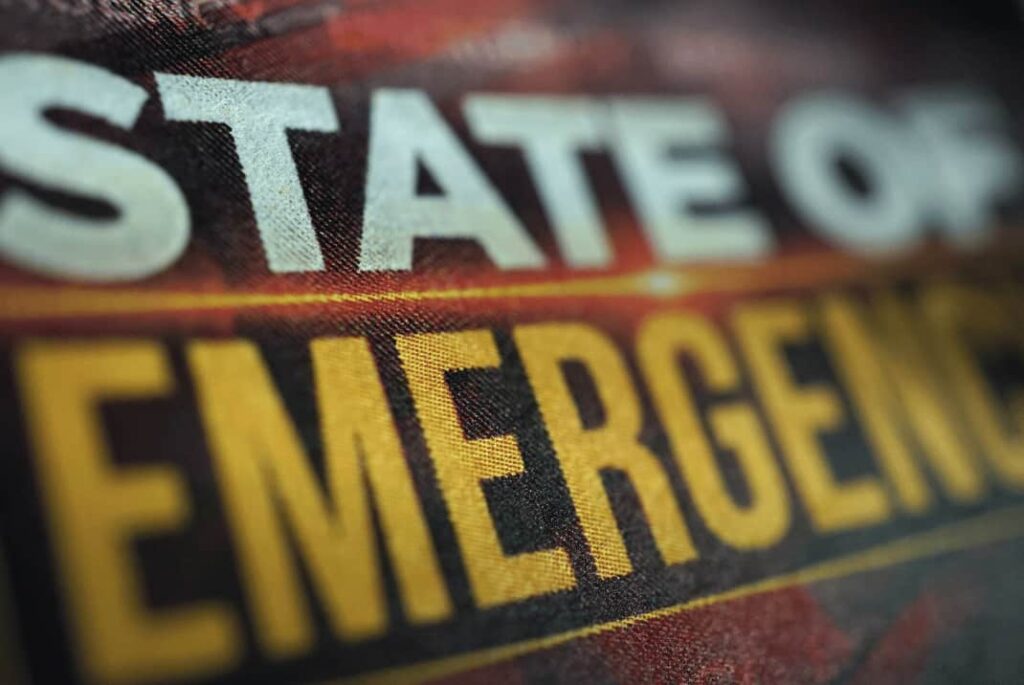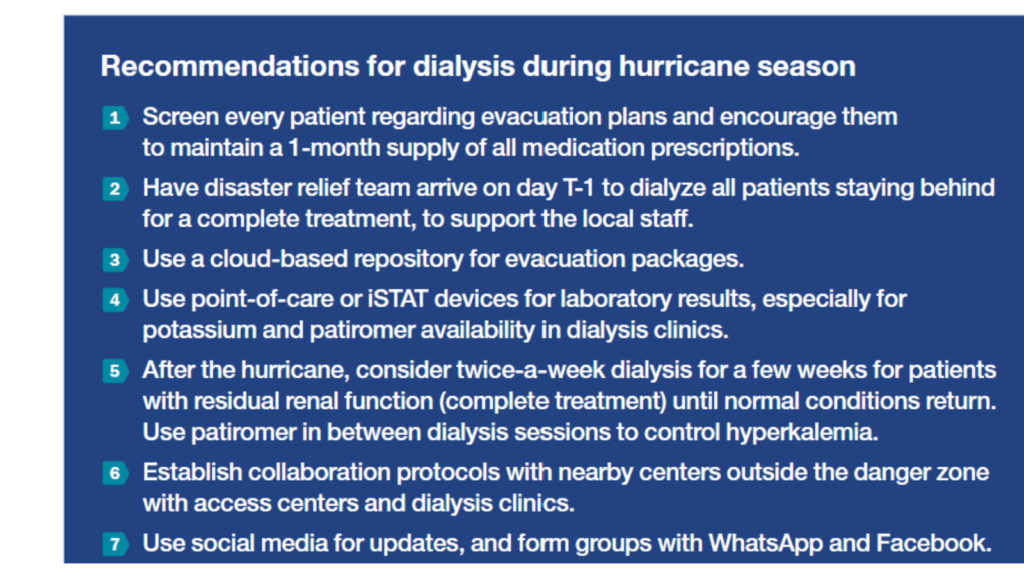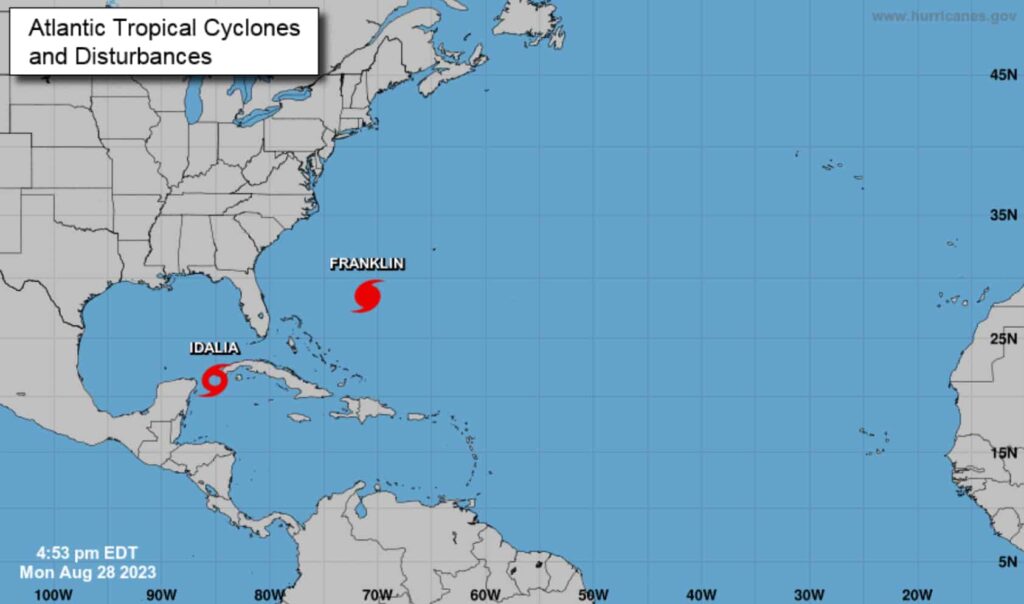EPI Introduction
The ASN Emergency Partnership Initiative was launched after the 2017 hurricane season, which crippled numerous islands in the Caribbean, leaving dialysis patients without access to dialysis treatment or transplant support, specifically in islands who are not US Territories. In June 2018, ASN convened the ASN Disaster Relief Summit in Washington, DC, bringing together individuals with expertise in disaster preparedness and response from across the country and the Caribbean. The participants concluded that there was a role for ASN in ongoing disaster preparedness and relief in roles that include:
- Partner with the Kidney Community Emergency Response Coalition (KCER).
- Through ASN’s Policy Team, address regulatory issues in preparedness and response that affect the kidney community.
- Expand education opportunities for Medical Directors and nephrologists in emergency preparedness and response.
- Provide education to the kidney community regarding federal disaster resources and the process required to access those resources.
- Increase awareness of the critical need for disaster preparedness.
- Assist in providing coordination of response and education as needed for the Caribbean Kidney Community.
Emergency Partnership Initiative (EPI) Mission Statement
The ASN Emergency Partnership Initiative (EPI) is a coalition of organizations allied to provide support to people with kidney diseases affected by disasters. Motivated by the adage coined by Benjamin Franklin in 1736, “an ounce of preparation is worth a pound of cure,” ASN EPI seeks to help patients and caregivers anticipate disasters that are likely to affect the regions where they live. EPI efforts recognize that disasters impact and may exaggerate historic sociodemographic inequities, so this initiative will include a focus on diversity, equity, and inclusion as well as justice.
The EPI work will focus on events throughout the United States and the Caribbean with an emphasis on disasters that are a result of climactic factors. Recent data shows increasing severity of disasters in correlation with climate change. As such, EPI will include a better understanding of the relationship between climate change and kidney diseases.
ASN Statement on Current Events in the Middle East
The American Society of Nephrology (ASN) mourns the tragedy unfolding in Israel and Gaza. Every person who has lost loved ones, colleagues, and partners in the region—and those who are concerned about their families and friends—is in our collective thoughts.
ASN has urged the Biden-Harris Administration to evacuate kidney patients, provide humanitarian resources via the Emergency Partnership Initiative, and bolster aid with a $10,000 donation to Direct Relief for vital resources.
ASN partners with Direct Relief, a humanitarian aid organization, active in all 50 states and more than 90 countries, with a mission to improve the health and lives of people affected by poverty or emergencies—without regard to politics, religion, or ability to pay. To learn more about Direct Relief’s work in the area, please visit their website.
If you wish to donate to on-the-ground humanitarian efforts, Direct Relief has vetted the following organizations:
- As a member of the International Red Cross and Red Crescent Movement, the Egyptian Red Crescent (ERC) works to alleviate suffering for those in crisis.
- Save a Child’s Heart: An organization committed to saving the lives of critically ill children suffering from heart disease.
- Magen David Adom (MDA): Israel’s national emergency medical, disaster, ambulance, and blood bank service.
- John of Jerusalem Eye Hospital Group: Charitable provider of expert eye care to patients regardless of ethnicity, religion, or ability to pay.
- IsraAID: A non-governmental organization partnering with local & civil society organizations to coordinate humanitarian efforts, providing psychosocial support & urgent aid to vulnerable communities, evacuees, and their families.
As Direct Relief provides updates on the conflict and adds to its list of vetted organizations, ASN will share more information on this webpage.
 EPI Resource Library Highlights
EPI Resource Library Highlights
Do You Have Contact Information for Your State Emergency Agencies???

Make sure that you have copies of this information in your emergency plan! This helpful website provides access to each state Emergency Management Agency webpage and contact information for each office.
Impact of a Hurricane on Dialysis Patients: A Case Study

Lessons learned after Hurricane Michael: how did we handle it and what can we do better?
Hurricane Resources for Kidney Patients and Professionals

Hurricane season is here! ASN’s Excellence in Patient Care (EPC) and the Emergency Partnership Initiative (EPI) have assembled resources on preparedness, safety, and responding after disaster. From prepping with kidney friendly foods to unique considerations for dialysis after a disaster, visit the EPI resource library today.
Charitable Giving Guide
Avoid scams by keeping the following tips in mind
(taken from Give.org and provided by the Better Business Bureau [BBB])
- Can the charity get to the impacted area? Not all relief organizations will be positioned to provide relief quickly. See if the charity already has a presence in the affected area.
- Should you send clothing and food? Local drives to collect clothing and food to send overseas may not be practical as the logistics and timing to deliver and disperse such items will be challenging. Relief organizations are better equipped to obtain what is needed, distribute it effectively and avoid duplication of effort.
- Does the relief charity meet BBB Charity Standards? You can verify a charity’s trustworthiness by viewing an evaluative report completed by BBB Wise Giving Alliance.
- Is the charity experienced in providing emergency relief? Experienced disaster relief charities are the best bet to help deliver aid as soon as possible. New entrants may have difficulty in following through even if they have the best of intentions.
- Are you considering crowdfunding appeals? If engaging in crowdfunding, it is safest to give to someone you personally know and trust, and review the platform’s policies regarding fees and distribution of collected funds. If the crowdfunding request is from a charity, check out the group by visiting Give.org. Keep in mind that some crowdfunding sites do very little vetting of individuals or organizations that decide to post for relief assistance. Sites that take security measures will usually provide descriptions of these procedures.
- Does the appeal make exaggerated financial claims such as “100% will be spent on relief”? Charities have fundraising and administrative expenses. Any charity claiming otherwise is potentially misleading the donating public. Even a credit card donation will have a processing fee.

